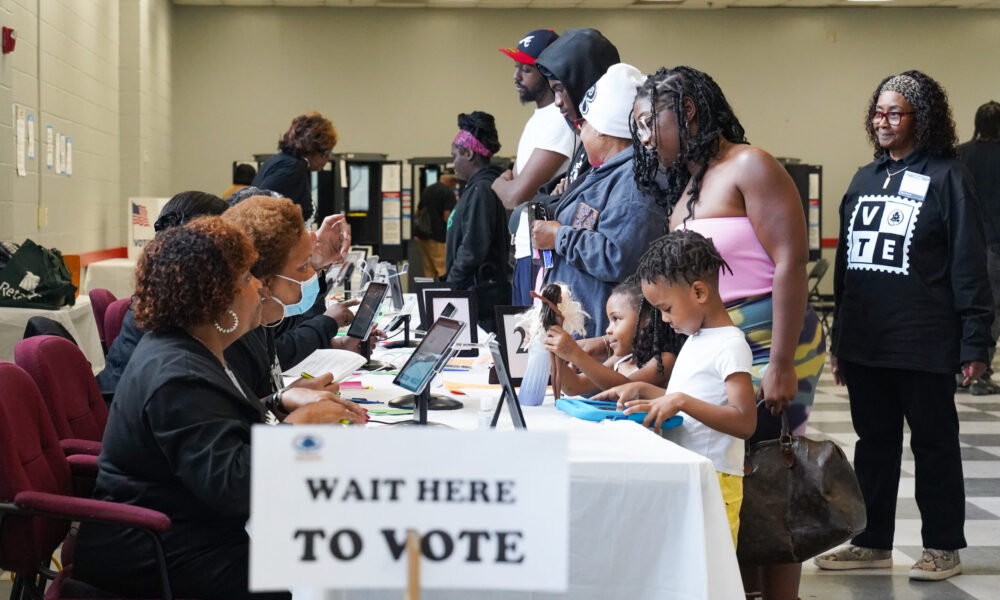In 2021, the Biden administration enacted an executive order requiring federal agencies to promote voter access. Agencies were tasked with making registration and learning how to vote easier, as well as with improving language offerings and disability access. In this first week in office, President Trump quickly rescinded this executive order. His actions make registering and learning how to vote harder, making it harder for US voters to have a say in their government. What’s worse, President Trump’s allies in Congress are trying to make it even harder to vote. Members of the Republican majority in the U.S. House have proposed two bills that would substantially alter how people register to vote and how election officials maintain voter rolls.
A dangerous “Safeguard”
Rep. Chip Roy (R-Tex.) has proposed, under the cynical title of the “Safeguard American Voter Eligibility (SAVE) Act,” a bill that, if passed, would require every American to provide documentary proof of citizenship to register or re-register to vote. This same bill passed the House last year, but stalled in the Senate. This session, with partisan control shared across Congress, the chances it gets through the Senate and is signed into law are higher.
Not only is the SAVE Act unnecessary, as federal and state law already require that only American citizens can vote in elections, but it also has the dangerous potential to wrongly disenfranchise eligible voters. The so-called SAVE Act places the burden of verifying people’s right to vote on the individual voter, instead of the government. Government-issued driver’s licenses, including REAL IDs, military IDs, and tribal identification do not meet the SAVE Act’s standards. Instead, documentary proof of citizenship would include a passport or birth certificate, materials that over 21 million Americans of voting age don’t have readily available. About 146 million Americans don’t have a valid passport. This requirement would make exercising the right to vote more costly. Passport applications fees can cost up to $160, and execution fees up to $35.
Importantly, some groups are less likely to have documentary proof of citizenship than others. A 2023 survey found that older Americans are less likely to have the documents that would be required under the SAVE Act, and two-thirds of Black Americans don’t have a current US passport. Millions of women who changed their names after marriage lack documentary proof of citizenship with their new names. Lower-socioeconomic-status citizens are also less likely to have documentary proof of citizenship.
The SAVE Act would upset or end online voter registration across the county, a service that 8 million Americans used to register in 2022 alone. It would also prohibit voters from being able to mail in their registration applications, as they would be required to go to election offices in person with documentation in order to complete their registrations. Automatic voter registrations through motor vehicle agencies and other agencies—currently required by National Voter Registration Act (NVRA) of 1993 —would be “severely gutted.”
We can already see how such a requirement hurts eligible voters in Arizona and Kansas, which have adopted proof-of-citizenship laws. The Kansas law, passed in 2011, hasn’t been enforced since 2018; federal courts blocked Kansas’ 2011 law after it kept 31,000 eligible citizens from registering to vote—12 percent of those trying to register for the first time. Some were blocked from registering even after providing the required documents. Young and politically-unaffiliated voters were the most affected by the proof-of-citizenship policy.
In Arizona, tens of thousands were blocked from registering across the state. In Maricopa County alone, about 17,000 voters were kept from registering. A Votebeat analysis found that voters on Native land, on college campuses, and who were unhoused were “disproportionately represented among voters in Arizona who haven’t provided proof of citizenship.”
Unfortunately, it isn’t only the federal government considering adding a proof-of-citizenship policy. Republicans in the Michigan state legislature proposed an amendment to the state constitution that would require proof of citizenship to register to vote. Luckily, it isn’t likely to pass the legislature, but Republicans are preparing a campaign to get the amendment on the 2026 ballot. Michigan Secretary of State (and 2026 candidate for governor) Jocelyn Benson argues that the amendment would “gut Michiganders’ voting rights.”
Attacking the voter rolls
The NVRA established federal voter registration requirements and, importantly, instituted a removal blackout period wherein states can’t remove voters from voter rolls within 90 days of a federal election.
Rep. Andy Biggs (R-Ariz.) has proposed a new bill that would repeal the NVRA entirely—not only making it more difficult to vote, but ending protections against purges and giving states the ability to throw voters off the rolls no matter how close to the election.
As I wrote in a blog post before the 2024 election, voter file maintenance has become a focus of many election-denying groups like True the Vote. Using questionable means, these organizations challenge the eligibility of thousands of voters. Conservative groups have also filed lawsuits or otherwise accuse states of poor list maintenance practices. These attacks are premised on outright falsehoods and conspiracy theories about large-scale illegal voting that simply doesn’t exist. And as I’ve written before, the Trump administration’s Department of Justice is heavily influenced by election deniers, could put enforcement of basic civil rights and voting rights laws at risk.
An open invitation to undermine voting rights
The combination of a federal proof of citizenship requirement and a repeal of the NVRA would likely encourage states to undergo aggressive purges of their voter rolls—purges that could be done at any time, even close to elections. It’s highly likely that these purges would erroneously remove eligible voters, as was the case in Arizona and Kansas. Moreover, science has shown that purges disproportionately target voters of color.
Trump’s Department of Justice has already stopped pursuing a case against Virginia’s voter purge program that targeted eligible voters, including naturalized citizens, within the blackout period before the 2024 general election. A similar case in Alabama is expected to be dropped soon. Not only is the DOJ dropping current cases, it has also instituted a freeze of the Civil Rights Division wherein it will not pursue any new cases, indictments, or settlements until nominee Harmeet Dhillon is confirmed. Dhillon, who has been referred to as “one of the leading legal figures working to roll back voting rights across the country,” would pose a danger to voting rights across the country.
Protect voting rights by contacting your members of Congress and tell them to vote against these bills when they come to the floor for a vote in the House.

